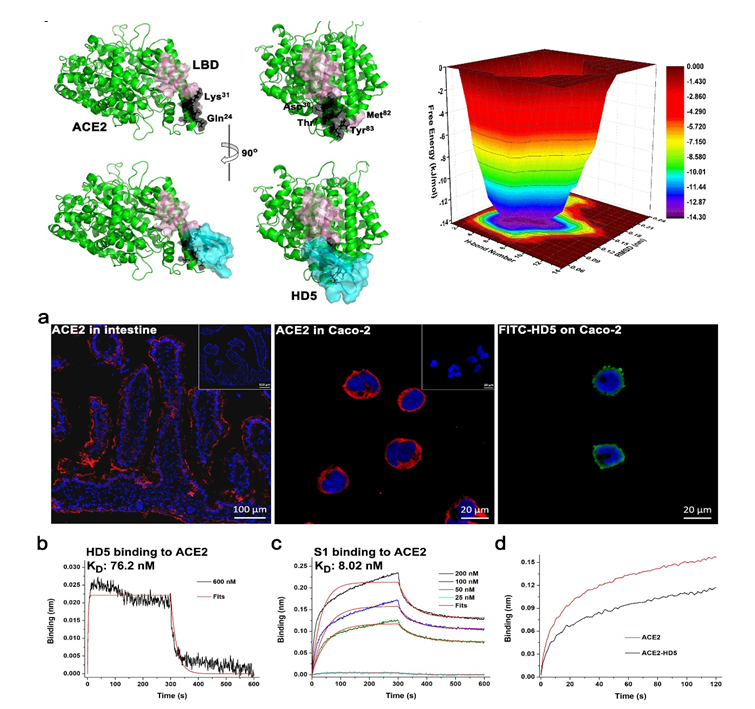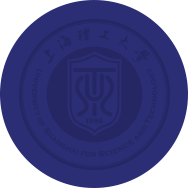A distinguished paper entitled “Human Intestinal Defensin 5 Inhibits SARS-CoV-2 Invasion by Cloaking ACE2” will be published in the authoritative international journal Gastroenterology, a journal ranking the first in the journals of Gastroenterology & Hepatology and on the top of the first section of the Chinese Academy of Sciences. This is an initial achievement belonging to Li Daixi, associate professor of USST, who actively responded to the science and technology war against the pandemic and conducted the interdisciplinary cooperation to promote the research and development(R&D) of antiviral drugs.
Against the outbreak and transmission of COVID-19, all countries expect specific drugs for anti-SARS-CoV-2. Due to the complexity of viral structure and transmission mechanism of SARS-CoV-2, the R&D of effective and safe drugs and/or vaccines for anti-SARS-CoV-2 has become a pressing challenge and an important topic in the medical research field all over the world. In addition, recent clinical research has proved that severe liver and kidney damage, even life-shortening caused by irrational use of drugs for surviving patients. So the R&D of peptide inhibitor becomes the key to the prevention and treatment of COVID-19.
Generally, there are three strategies against the pandemic of COVID-19:
1. Blocking the spike (S) protein’s binding to human ACE2 which is located on the surface of epithelial cells;
2. Preventing the RNA replication;
3. Preventing the replication of major structural proteins.
The first strategy is to block the spread of the virus, and the latter two are to prevent the replication of the virus.
There are two methods to block the transmission of the virus. The first one is to use polypeptide inhibitors to occupy the ligand-binding domain (LBD) of the Angiotensin-Converting Enzyme 2 (ACE2), whose purpose is to block the binding of spike protein. The second one is to let polypeptide inhibitors bind tightly onto receptor-binding domain(RBD) of S spike protein, and then block its binding with ACE2. The two methods are both what Li’s team is researching now. The above initial results support the scientific hypothesis of the first method.
This study selects several potential polypeptide inhibitors from tens of candidate peptides through the high-performance computation on cloud brain platform of Pengcheng Laboratory. It is expected that the polypeptide inhibitors will preferentially bind with human ACE-2 on human host cells to block the invasion of the spike protein of SARS-CoV-2 and finally to block the spread of the pandemic of COVID-19.
The high-throughput drug-screening results have also been verified by modern technologies such as bio-layer interferometry (BLI) and immunofluorescence microscopy. Among them, the binding effect of HD-5 was first confirmed.
With its high specificity,the natural polypeptide inhibitor developed by this method enjoys the advantages of safety and efficiency with minimal side effects. The research explores an innovation approach for the R&D of anti-SARS-CoV-2 medicine, and embodies great practical significance and theoretical value for the coming R&D and design of medicine for other novel coronavirus.

A Brief Introduction of Dr. Li Daixi
Dr. Li Daixi, currently associate professor and postgraduate supervisor of Computational Biology Laboratory at USST, graduated from Zhejiang University with a doctoral degree in Physical Chemistry, and furthered his post-doctoral studies in the Department of Biomedical Engineering at the University of South Carolina. He is a council member of Shanghai Committee of Free Radical Biology and Medicine, as well as an expert at the academician expert workstation of Shanghai Tofflon Science and Technology Co. Ltd. His research focuses on the theoretical and application study of computational biology, artificial intelligence, drug design and development, microbiology, and cryobiology.
Since 2010 when he came back to China, published more than 70 academic papers, of which 40 are international papers indexed by SCI. In 2013, he won a second prize at Science and Technology Award by China Machinery Industry Ministry and a third prize at Shanghai Science and Technology Award.
Main research directions:
Computational biology: molecular protection, molecular regulation and controlled crystallization, drug design
Artificial intelligence: intelligent recognition and intelligent diagnosis
Major researches and achievements:
1. Molecular protection of protein-drug’s bioactive structure;
2. Controlled crystallization of small molecule drugs and regulation of crystal polymorph and morphology;
3. Molecular regulation, screening and optimization of small molecule drug lyophilization prescription;
4. Drug design and screen for novel coronavirus;
5. Rapid identification as well as qualitative and quantitative analysis of pathogenic microorganisms by artificial intelligence.


